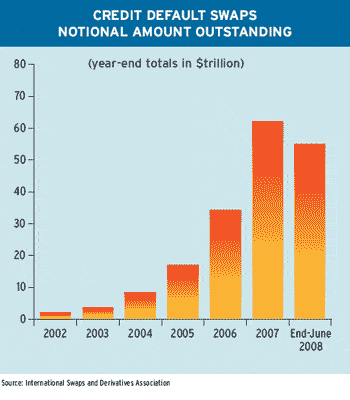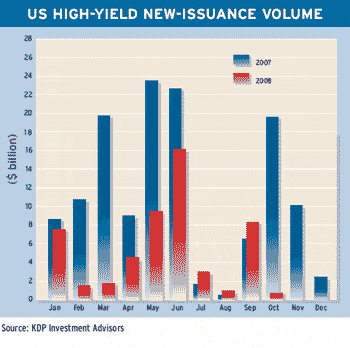 Participants in the over-the-counter credit default swaps (CDS) market have sharply reduced the notional amount of CDS contracts outstanding this year through a series of portfolio compression cycles, also known as tear-ups. The notional outstanding volume of credit derivatives was $54.6 trillion at the end of June, down from $62.3 trillion at the end of last year, according to the International Swaps and Derivatives Association (ISDA).
Participants in the over-the-counter credit default swaps (CDS) market have sharply reduced the notional amount of CDS contracts outstanding this year through a series of portfolio compression cycles, also known as tear-ups. The notional outstanding volume of credit derivatives was $54.6 trillion at the end of June, down from $62.3 trillion at the end of last year, according to the International Swaps and Derivatives Association (ISDA).
“This reduction in notionals is major progress by anyone’s standards,” says Eraj Shirvani, ISDA chairman and co-head of credit sales and trading at Credit Suisse. “That we have been able to reduce outstanding CDS by more than $25 trillion during this period of immense growth and activity for our products is testament to the will and force behind the industry’s efforts to keep operational issues firmly in check,” he says.
ISDA says the reduction in notional amounts outstanding has significantly reduced operational, legal and capital costs for industry participants and improved efficiency in the CDS market. A CDS is an agreement between two counterparties, typically for five years, in which the buyer makes periodic payments to the seller in return for a promised payoff if a third party defaults. The cost of such protection  against default has risen sharply as a result of the global credit crunch, as well as the growing risk of corporate defaults in a weakening economy.
against default has risen sharply as a result of the global credit crunch, as well as the growing risk of corporate defaults in a weakening economy.
Inflated Risk Perceptions
“Notional outstandings are often misunderstood,” says Robert Pickel, executive director and chief executive of ISDA. “While they tend to give an exaggerated impression of amounts at risk, reducing notionals helps both front and back offices,” he says. Canceling out economically offsetting transactions reduces the cost and operational workload of managing those transactions, according to Pickel.
The notional principal, or notional amount, of a derivatives contract is a hypothetical underlying quantity upon which interest rate or other payment obligations are calculated. These notional amounts are an approximate measure of derivatives activity and, for CDS, reflect the face value of bonds and loans on which participants have written protection. Surveys tend to overstate the size of the market because of double counting when each party to a trade separately reports its own side.
The decrease in notional outstanding CDS amounts in 2008 reflects a range of activities, including compression exercises run by TriOptima, Creditex and Markit, ISDA says. In addition, auctions and settlements of the recent series of credit events, including Fannie Mae, Freddie Mac and Lehman Brothers, have proceeded smoothly, according to ISDA, which represents participants in the privately negotiated derivatives industry. ISDA has about 850 member institutions in 56 countries.
$24.5 Trillion Reduction
In the first 10 months of this year, TriOptima reduced the amount of CDS notional outstandings by $24.5 trillion through its series of compression cycles, which have included index, tranche and single-name trades. The latter relate to protection from the risk of default by a single company. Meanwhile, Creditex and Markit, which focus on single-name transactions, had completed some $550 billion in compressions by October 31 after beginning such services only recently.
From $54.6 trillion of notional CDS outstandings at the end of June, further reductions since then have reduced outstandings to about $47 trillion before taking into account the new trades done since then, according to ISDA.
 |
|
Robert Pickel, executive director and CEO of the International Swaps and Derivatives Association. |
TriOptima confirmed that the 12% decline in CDS notional outstandings in the first half of 2008 was primarily due to its triReduce tear-up cycles. “As the sole provider of portfolio compression services in the first half of 2008, we can confirm that tear-ups were a positive factor in stabilizing the growth in notional principal levels that had attracted the attention of regulators,” says Brian Meese, group CEO at TriOptima.
“We have long believed that aggressive use of tear-ups is one of the most effective ways to manage risk and a vital complement to central counterparty activities,” Meese says.
Record Participation by Dealers
TriOptima has offered more than 40 compression cycles since the beginning of the year. Participation has reached record levels as dealers continue to reduce their notional principal outstandings, increase their liquidity and manage their counterparty credit exposures, the company says.
Markit and Creditex have conducted 13 compression runs since August 27, after they were selected by ISDA to provide infrastructure to support commitments made by major market participants to the Federal Reserve Bank of New York relating to improved operational efficiency and risk reduction.
Portfolio compression reduces the number of line items in CDS portfolios without changing the risk parameters of the portfolio. It does this by terminating existing trades and replacing them with a smaller number of trades with the same risk profile and cash flows as the initial portfolio, but which require a smaller amount of regulatory capital to be held against positions.
Meanwhile, the Depository Trust & Clearing Corporation (DTCC) says its central registry for the CDS market, known as the Trade Information Warehouse, has successfully completed the automated credit-event processing and settlement of over-the-counter CDS contracts related to the bankruptcy of Lehman Brothers. This processing resulted in about $5.2 billion in net fund transfers from sellers of protection to buyers of protection. The portion of this net settlement that could be allocated to trades between major dealers was settled through the CLS Bank, the central settlement bank for the foreign exchange market, which also acts as the settlement provider to the Trade Information Warehouse.
At the time of the Lehman Brothers bankruptcy in September, approximately $72 billion in CDS written on Lehman Brothers were registered in the warehouse, the DTCC says. Analysts had estimated that as much as $400 billion in CDS contracts were linked to Lehman Brothers. If the lower volume of outstandings had been known at the time, there would have been considerably less anxiety in the markets about the ability of hedge funds and others to make good on these insurance-like instruments.
Inaccurate Speculation
The idea that the industry lacks a central registry for the over-the-counter CDS market is grossly misleading and has resulted in inaccurate speculation on the overall size of the market, its role in the mortgage crisis and the size of potential obligations under the CDS related to Lehman Brothers, the DTCC said in a release. It suggested that such speculation could have contributed to turmoil in the financial markets but said it is difficult to quantify this effect.
To help increase transparency in the CDS market, the DTCC last month began releasing weekly data on the top 1,000 credit default swaps, including the gross amount and a net figure that excludes offsetting trades between two parties.
The DTCC established the Trade Information Warehouse as the electronic central registry for the CDS market in November 2006. Since that time, the vast majority of CDS trades have been registered in the warehouse, it says. What’s more, all of the major global CDS dealers also have registered most of the contracts executed before that date, it adds. Furthermore, less than 1% of CDS contracts currently registered in the warehouse relate to particular residential mortgage-backed securities, with an additional small amount from indexes with components relating to residential mortgages.
Deriv/SERV, a DTCC subsidiary, provides automated matching and confirmation for OTC derivatives contracts and electronically confirms more than 90% of CDS traded globally. According to DTCC, Deriv/SERV is the market’s first and only comprehensive trade database and centralized electronic infrastructure for post-trade processing of OTC derivatives.
The DTCC also clears and settles equities, corporate and municipal bonds, government and mortgage-backed securities, and money market funds. Last year it settled more than $1.86 quadrillion in securities transactions.
World’s Largest Clearinghouse
Last month the DTCC and LCH.Clearnet, the biggest independent central counterparty group in Europe, announced plans to merge. The planned merger would create the world’s leading clearinghouse covering a broad range of markets and services, including both exchange-traded instruments and OTC products, such as interest rate swaps, CDS, carbon emissions and freight contracts. Euroclear, currently the largest shareholder in LCH.Clearnet, with a 15.8% stake, intends to support the transaction in principle and remain a shareholder.
The DTCC and LCH.Clearnet have signed non-binding heads of terms, also known as letters of intent, and expect to sign a definitive agreement and announce the detailed terms of the transaction by March 15, 2009.
“By combining DTCC and LCH.Clearnet’s natural synergies and complementary skills, we expect our customers will not only see significant cost savings in the clearance and settlement of the many securities and instruments we already service but also greater access to a more diverse range of product offerings and support of emerging asset classes,” says Donald Donohue, chairman and CEO of the DTCC.
The new clearinghouse would operate on a user-owned, user-governed model, with LCH.Clearnet moving to an at-cost based structure similar to DTCC’s within three years. Roger Liddell, CEO of LCH.Clearnet, will be CEO of the new LCH.Clearnet HoldCo, and Donohue will be chairman. Merrill Lynch International is advising LCH.Clearnet in connection with the proposed merger, and Goldman Sachs is advising the DTCC.
A European Solution
Meanwhile, the European Central Bank and eurozone central banks last month said they want a European central clearinghouse for the CDS market. The ECB held a meeting with exchanges and clearers, including LCH.Clearnet and Eurex, the derivatives arm of the Deutsche Börse.
“Participants at the meeting underlined the merits of multiple solutions in general and of at least one European solution,” according to an ECB statement. The ECB said its meeting complemented initiatives by the Federal Reserve Bank of New York. For the past several years the New York Fed has been encouraging dealers to reduce risks in the CDS market and cut a backlog of unconfirmed transactions.
At least four US groups are eager to provide CDS clearing operations, including a partnership between Chicago-based CME Group and Citadel Investment, as well as a pairing of IntercontinentalExchange (ICE) and the Clearing Corporation (TCC), which is owned by Goldman Sachs, Morgan Stanley and other dealers. Eurex and NYSE Euronext also have proposed CDS clearing facilities.
CDS indexes have become the new benchmarks of the credit crisis, with global daily trading volume regularly exceeding $100 billion, according to Barclays Capital, which has produced a handbook on the indexes.




